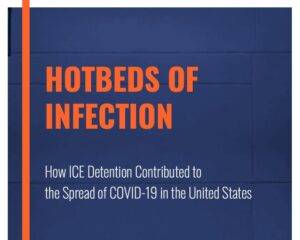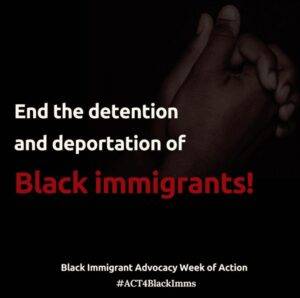Written by Gisele Bonnici, IDC Americas Regional Coordinator
IDC recognises the critical political shift that our US members and partners are navigating as we move into second gear in 2021. We stand with you in solidarity as you take action and opportunity to ensure dignity and humanity for refugee and migrant communities.
This January saw a daily average of 14,195 people held in immigration detention in the United States, the lowest in over 20 years, due to border closures, the asylum ban and expanded fast-track deportations. The significant drop has highlighted the arbitrary and unnecessary use of immigration detention that advocates have documented for decades.
President Biden’s opening executive actions in January, followed by initial steps to restore asylum processing on the US-Mexico border and the formal introduction of the US Citizenship Act of 2021 to Congress, are an encouraging move towards preventing the expansion of immigration detention. The most recent action to open up two detention facilities for migrant children, however, is of grave concern. IDC fully agrees with our US members and partners that so much more is urgently needed to dismantle the system, including an immediate closure to the worst identified immigration detention centers especially those locking up families and children, immediately ending private detention contracts and the harmful collaboration between immigration authorities and local law enforcement. Guided by numerous recommendations made to the new US administration by organisations like the American Civil Liberties Union, Freedom for Immigrants, Women’s Refugee Commission and Detention Watch Network, among others, positive policy reform of the immigration enforcement system can swiftly reduce the number of people harmed by immigration detention even further.
The dedicated and vocal work of US advocates at this time gives us collectively as a coalition and as a global movement, a huge opportunity to advocate for the end of immigration detention and a genuine shift to migration governance that prioritises engagement and well-being and invests in community-based alternatives.

Compelling new evidence of the high risk to the lives of migrants in the US detention system and the collective public health threat posed by immigration detention make the need for positive policy reform more urgent than ever. Both the Detention Watch Network’s Hotbeds of infection: How ICE Detention contributed to the Spread of COVID-19 in the United States, and a recent study by a multi-institution team Preventing the Spread of COVID-19 in Immigration Detention Centers Requires the Release of Detainees make an unequivocal call for the safe release of those in immigration detention in the United States into their communities. The impact of COVID-19 has heightened the severe harm of a migration governance system centered around locking people up rather than enabling engagement and integration of migrants and refugees through community programming.
“Human rights abuses and medical neglect could be avoided if those navigating immigration cases were able to do so at home with their families and in their communities, not behind bars.”
Detention Watch Network
IDC joined a broad campaign of over 200 organisations spearheaded by Freedom for Immigrants and Detention Watch Network, calling on the new US administration to immediately release people in Immigration and Customs Enforcement (ICE) custody amid the COVID-19 pandemic and cease all enforcement actions, deportations, and transfers between immigration detention facilities and from local, state, and federal jails and prisons into immigration detention. We invited you to read the letter here and to join the movement to #FreeThemAll.
In early February, US activists including the UndoduBlack Network, Black Immigrant Collective, African Communities Together among others, commemorated Black History Month by launching a Black Immigrant Advocacy Week of Action #Act4BlackImms to highlight the cruel and disproportionate impact that ICE immigration enforcement has on Black immigrants, and calling on the Biden administration to intentionally address systemic anti-Black racism within the asylum and migration systems. In particular, they call for an end to the increased deportations to Haiti and the designation of Temporary Protective Status or Deferred Enforced Departure with work authorisation for persons from Cameroon and Mauritania to prevent placing lives at great risk, and as protective measures against their detention and deportation.

Advocates at national and local levels, including case managers and legal advisers, agree that existing government-sponsored alternatives to detention programming fall short of being effective in critical ways, such as their conception process and focus. A move away from enforcement priorities is urgently needed within the design of alternative programs, so that the use of immigration detention is truly reduced rather than expanded under a different name.
Studies continue to show the positive impact of alternatives, including benefits in terms of operating costs, case resolution, and particularly, the protection of rights, well-being and early community integration. These benefits will become even more apparent as we move towards a new emphasis on programs centered on empowerment through access to individual support, rights, and engagement-based immigration processes. Further recommended reading on US alternative to detention programs:
- The Real Alternatives to Detention
- Making the Case for Ending Immigration Detention
- Latest evidence for ending family detention
- A better way: Community based programming as an alternative to immigration incarceration
Advocates identify key opportunities to move advocacy forward in this regard. Firstly, community organisations are already providing effective, humane alternatives. US advocates would like to see congressional leaders directing more investment to community programming, such as community-based case management services and the expansive network of non-profit organisations providing medical, legal, and other social services to immigrant communities. Secondly, the overwhelming and proven positive impact of access to legal counsel on case outcomes supports the need for government-funded legal representation. Finally, as we move away from the prevalence of enforcement-based alternatives to detention programs, we need to look beyond effectiveness indicators that focus solely on compliance, towards developing programs that incorporate metrics that evaluate well-being.
IDC joins our members and partners working towards the goal to see the establishment of a new comprehensive migration framework that does not depend on immigration detention, nor other enforcement-based procedures that amount to alternative forms of detention. IDC commits to this vision by supporting the development of widespread and inclusive alternatives to detention programs that are rights-based, engagement-based, community-based, and also incorporate effective and independent case management mechanisms to support case resolution and durable futures for migrant and refugee communities in the United States.